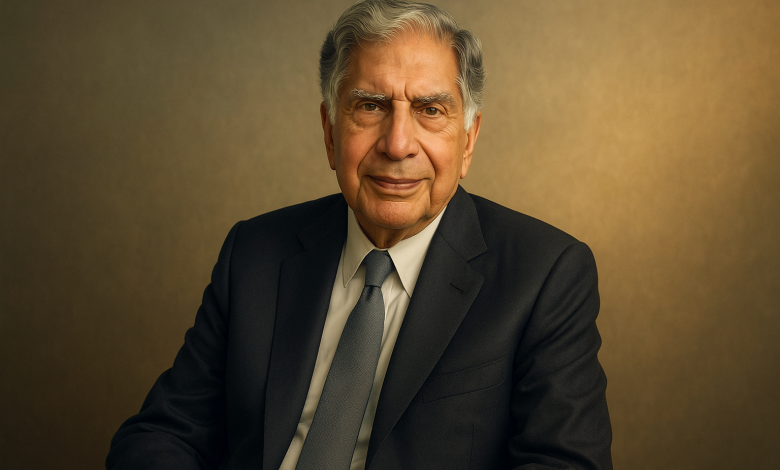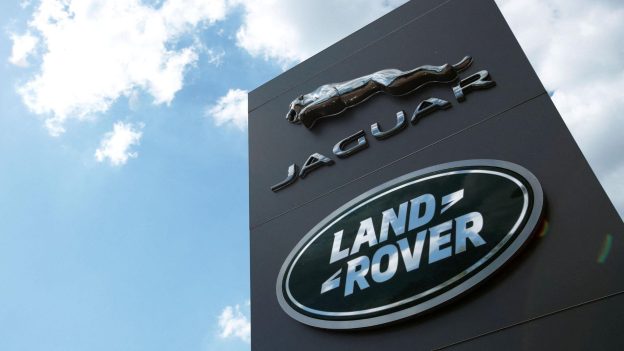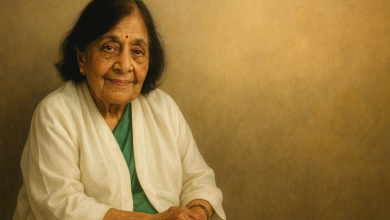Ratan Tata: Journey From Tata Group to Global Business Icon

In the vast history of Indian industry, few names shine as brightly and enduringly as Ratan Tata.
A man of incredible strength and bold vision, Ratan Tata redefined what it means to lead with integrity, purpose, a zeal to be at the helm and foresight.
As the former chairman of the Tata Group, India’s most respected and diversified conglomerate, he didn’t just grow a business empire; he crafted a legacy that transcends balance sheets and boardrooms.
Under his stewardship, the Tata Group transformed from a traditional Indian enterprise into a global powerhouse, acquiring marquee brands like Jaguar-Land Rover and Corus, and elevating Tata Consultancy Services to international prominence.
But beyond the headlines of high-stakes acquisitions and corporate growth lies a leader guided by deep-rooted values: humility, innovation, social responsibility, and unwavering ethics.
Ratan Tata’s journey is more than a business story, it’s a compelling narrative of visionary leadership in a rapidly evolving world.
He dared to dream of an India that could not only compete with the world’s best but lead it with dignity and compassion.
Whether launching the Tata Nano to bring affordable mobility to millions or reinvesting wealth into education, healthcare, and rural development, his impact ripples far beyond boardrooms.
What shaped this extraordinary leader? What principles guided his decisions? And how did he balance ambition with altruism in a cutthroat corporate world?
This article delves into the remarkable journey of Ratan Tata, a man whose name evokes both admiration and inspiration, tracing the milestones, the mindset, and the enduring legacy of a titan who changed the face of Indian and global business.
Early Life and Education
Ratan Naval Tata was born on December 28, 1937, in Bombay (now Mumbai), into one of India’s most prominent and respected industrial families.
He is the great-grandson of Jamsetji Tata, the founder of the Tata Group, and the son of Naval Tata, who was adopted into the Tata family.
Despite being born into privilege, Ratan Tata’s childhood was not without challenges.
His parents separated when he was just ten years old, and he was raised by his grandmother, Lady Navajbai Tata, who played a significant role in shaping his values and emotional resilience.
He began his schooling at the prestigious Campion School in Mumbai and later attended Cathedral and John Connon School.
After completing his education in India, Ratan Tata moved to the United States to pursue higher studies.
He earned a degree in architecture with a specialization in structural engineering from Cornell University in 1959.
Later, he furthered his education through the Advanced Management Program at Harvard Business School in 1975, an experience that deepened his understanding of global business and leadership.
Ratan Tata’s early exposure to both Indian traditions and Western education helped shape his distinctive worldview, one that blends ethical leadership with innovation.
These foundational years played a crucial role in molding him into the visionary leader who would go on to redefine the Indian corporate landscape.
Entry into the Tata Group and Early Career
Ratan Tata officially began his career in the Tata Group in 1961, joining one of the conglomerate’s key companies, Tata Steel.
Unlike what might be expected for someone from such a powerful industrial family, he did not start in an executive office.
Instead, he was placed on the shop floor, where he worked alongside blue-collar employees, learning the nuts and bolts of steel production.
This immersive experience included tasks like shoveling limestone and working in the blast furnaces, offering him a firsthand view of the challenges faced by workers and the operational intricacies of a manufacturing giant.
This early period proved to be a crucial learning ground.
Ratan Tata developed not only a technical understanding of the business but also a deep respect for the workforce—a value that would remain central to his leadership philosophy throughout his career.
He often reflects on this time as one of humility, discipline, and invaluable insight into how the Tata Group operated from the ground level.
As the years went by, Ratan Tata gradually rose through the ranks, taking on increasing responsibilities across various Tata companies.
His ascent wasn’t fast-tracked despite his lineage; he had to prove himself through performance, perseverance, and innovative thinking.
During the 1970s and 1980s, he worked on turning around a number of struggling ventures within the group, which demonstrated his capability to lead with both vision and practical business acumen.
These formative years laid a strong foundation for his future role as Chairman, shaping him into a leader who combined boardroom strategy with grassroots empathy—qualities that would later define the transformational era he ushered in for the Tata Group.
Transformational Leadership as Chairman of Tata Group
In 1991, Ratan Tata stepped into the role of Chairman of the Tata Group, inheriting a vast but loosely structured business empire comprising nearly 100 companies operating independently under the Tata umbrella.
The group, though respected, lacked a unified strategic direction and was largely focused on the domestic market.
Ratan Tata’s appointment marked the beginning of a bold and transformative era—not just for Tata, but for Indian industry as a whole.
From the very outset, Ratan Tata displayed visionary leadership.
He worked to modernize and streamline the Tata Group, consolidating its scattered entities under a stronger, unified brand identity.
One of his first key initiatives was to foster a culture of innovation and professionalism, ensuring that leadership positions were filled based on merit rather than seniority or internal politics.
He also emphasized technology, customer focus, and international standards—steering the group away from traditionalism toward a forward-thinking, global mindset.
Under his leadership, Tata Group underwent an aggressive phase of global expansion, most notably through a series of high-profile international acquisitions including Tetley tea, Corus steel, and Jaguar-Land Rover, significantly increasing the brand’s international presence and influence.
Through these strategic moves, Ratan Tata transformed Tata from a respected Indian conglomerate into a globally recognized powerhouse.
His bold but calculated decisions, long-term vision, and values-driven leadership not only elevated the group but also set a new benchmark for Indian industry worldwide.
Major Achievements and Contributions
Ratan Tata’s tenure as Chairman of the Tata Group (1991–2012, with a brief return as interim chairman in 2016) was nothing short of transformative.
He redefined the scope, vision, and impact of the group—not only in India but across the globe. With his strategic foresight, risk-taking ability, and commitment to values, he led the group through a period of unprecedented expansion, innovation, and diversification.
His achievements are a reflection of both bold leadership and a deep-rooted desire to serve society through business.
Global Expansion through Acquisitions
One of Ratan Tata’s most celebrated accomplishments was taking the Tata Group beyond Indian borders and positioning it as a formidable player on the world stage.
This era of global expansion was driven by a series of landmark acquisitions that redefined India’s presence in international business circles.
In 2000, Tata Tea acquired Tetley Tea, a well-established British brand, for $450 million.
This was a historic move—it marked the first time an Indian company had successfully taken over a major British company, and it positioned Tata as the second-largest tea company in the world.
The acquisition also reflected Ratan Tata’s long-term vision of creating truly global Indian enterprises.
In 2007, Tata Steel acquired , for over $12 billion. At the time, it was India’s largest corporate takeover of a foreign firm.
The move instantly made Tata Steel the fifth-largest steel producer in the world and gave it access to high-end steelmaking technology, global markets, and scale.
In 2008, Tata Motors acquired the iconic Jaguar and Land Rover brands from Ford Motor Company for $2.3 billion.
Though seen as a risky bet during a global recession, this acquisition turned out to be a masterstroke.
Under Tata’s stewardship, JLR became profitable within a few years and grew to become a cornerstone of Tata Motors’ global revenue.
Through these deals, Ratan Tata demonstrated extraordinary courage and belief in India’s industrial capabilities.
He proved that Indian companies could lead, not just follow, in the global business environment.
Fostering Indigenous Innovation
While Ratan Tata was making global headlines, he remained deeply invested in the Indian market and its unique needs.
A major part of his legacy is his commitment to developing innovative products that serve the everyday Indian consumer.
The Tata Indica, launched in 1998, was the first passenger car to be entirely designed and manufactured in India.
Despite early challenges, the car eventually became a success, proving that Indian engineering could compete in the automotive industry.
The Indica also marked Tata Motors’ entry into a highly competitive segment, paving the way for future innovation.
Perhaps his most ambitious project was the Tata Nano, unveiled in 2008 with the goal of producing a car that would be affordable for the masses.
Priced at around ₹1 lakh (roughly $2,000 at the time), the Nano was intended to provide a safer alternative to two-wheelers for lower-income families.
Although its commercial performance did not meet expectations due to perception issues and marketing missteps, the Nano remains a powerful symbol of inclusive innovation and Ratan Tata’s intent to bridge economic divides.
These projects reflected his personal involvement and passion—he wasn’t just approving blueprints; he was actively engaged in conceptualization, design reviews, and even personally test-driving prototypes.
Expanding the Tata Group’s Horizon
In addition to globalization and product innovation, Ratan Tata led an era of significant diversification that repositioned the Tata Group as a multi-sector powerhouse.
Under his leadership, Tata Consultancy Services (TCS), which had been founded in 1968, grew into one of the world’s leading IT services firms.
Through aggressive scaling, client-focused delivery, and innovation in software solutions, TCS became the crown jewel of the Tata portfolio—driving massive profits and establishing a solid international reputation.
In the telecommunications space, Tata entered through Tata Teleservices, eventually forming a partnership with Japan’s NTT Docomo in 2008 to create Tata Docomo.
Though the venture faced challenges in a highly competitive market, it marked the group’s ambition to remain part of India’s rapidly evolving digital and telecom revolution.
Ratan Tata also recognized the future of Indian retail consumption and expanded the group’s footprint with Tata Trent, which operates popular retail chains like Westside and Landmark.
These ventures helped establish Tata’s presence in the lifestyle and consumer retail segment, capitalizing on India’s growing middle class and urbanization.
His diversification strategy wasn’t just about entering new markets—it was about building sustainable, forward-thinking businesses aligned with India’s evolving economic landscape.
Through each of these achievements, Ratan Tata maintained a balance between commercial ambition and ethical leadership.
He was deeply committed to the Tata values of trust, integrity, and community service.
Even as the group’s market cap and global presence soared, he ensured that corporate responsibility remained a core principle—reflected in Tata’s continued contributions to education, healthcare, rural development, and social innovation through the Tata Trusts.
Awards and Recognitions
Ratan Tata’s legacy is reflected not just in the companies he built or the industries he transformed, but also in the widespread recognition he has received for his contributions.
Over the years, his leadership and integrity have earned him respect across India and around the world.
In India, he has been honored with two of the highest civilian awards.
In 2000, he received the Padma Bhushan, recognizing his early efforts in shaping modern Indian industry.
In 2008, he was awarded the Padma Vibhushan, the second-highest civilian honor in India, acknowledging his vision, global achievements, and commitment to ethical business practices.
Ratan Tata has also been awarded honorary degrees by some of the most prestigious institutions globally.
These honors reflect not only his impact as a business leader but also the values he represents.
Universities like Harvard, Cornell, and the London School of Economics have recognized his ability to combine innovation, leadership, and social responsibility in a way that inspires future generations.
On the global stage, he is seen as one of the most respected figures in business. His achievements go far beyond boardrooms and balance sheets.
He is admired for his calm demeanor, his thoughtfulness, and his focus on building businesses that serve society as much as they serve shareholders.
Invitations to international forums, leadership panels, and philanthropic discussions often include his name, a reflection of how widely he is valued.
What makes his awards truly meaningful is that they recognize more than success.
They highlight the way he has led with integrity, stayed grounded in his values, and earned admiration through quiet, consistent excellence.
Philanthropy and Social Impact
Ratan Tata regards philanthropy as a fundamental aspect of achieving success, embodying the enduring values of the Tata family.
He upholds a philosophy where wealth is a tool to address societal needs, tackle genuine issues, and foster a more caring society.
An exemplary initiative led by him is the establishment of a cutting-edge hospital for cancer treatment and research in Mumbai.
The core objective is clear yet impactful: to offer top-notch medical care to those lacking means to access it.
The hospital does not merely address physical ailments; it instills hope in families nationwide, blending innovative technology with a personal approach that mirrors Ratan Tata’s innate compassion.
His compassion extends beyond humans. Surprising many but resonating with those familiar with him, he advocated for India’s inaugural veterinary hospital exclusively for small animals.
Situated in Mumbai, this institution provides specialized medical attention, surgical procedures, and recovery services tailored for pets and stray animals often overlooked in terms of healthcare.
It underscores a profound aspect of Ratan Tata’s character – his empathy transcends boundaries, encompassing even the voiceless in his vision for a brighter future.
Through his active guidance of Tata Trusts, both during and post his corporate stewardship, Ratan Tata has backed various causes: educational support for disadvantaged children, rural advancement, nutritional schemes, clean water projects, and exploration into uncommon ailments. Unlike numerous prominent donors, he shuns the limelight, prioritizing impact over accolades. While his endeavors may be unassuming, their influence is substantial.
Colleagues often highlight his personal engagement.
He does not merely donate and disengage – he inquires, pays heed, and ensures commitments are fulfilled.
Whether inspecting a remote village with a newly established school or monitoring the progress of a healthcare initiative, he brings the same genuineness and attention to detail that characterized his corporate tenure.
In an age where philanthropy can sometimes appear superficial, Ratan Tata distinguishes himself.
His deeds are rooted in empathy, guided by long-range perspectives, and propelled by the belief that dignity, health, and opportunities are not privileges but fundamental rights. It transcends mere charitable acts; it involves constructing frameworks that elevate, bolster, and persevere.
Post-Retirement Influence
Even after stepping down as Chairman of the Tata Group, Ratan Tata has never truly stepped away.
His official title may have changed, but his presence and influence remain deeply embedded in the fabric of Indian business.
In many ways, his role has simply evolved, from the man at the helm to the quiet force guiding from the sidelines.
These days, Ratan Tata is often seen more as a mentor than a mogul.
Whether it’s offering advice to emerging business leaders or quietly lending his perspective to the Tata Group’s leadership, he continues to shape decisions and inspire direction.
Those who’ve interacted with him describe him not as a towering figure barking orders, but as someone who listens, reflects, and speaks only when necessary, yet when he does, his words carry the weight of experience, and often, quiet brilliance.
One of the most striking aspects of his post-retirement life has been his growing interest in India’s startup ecosystem.
Long before it became fashionable, he started investing in young companies, not for control or returns alone, but because he believed in what they were trying to build.
His early backing of companies like Ola and Paytm signaled his faith in the new generation of Indian entrepreneurs.
But it’s not just about writing a cheque, many founders have shared how his belief in them meant more than the funding itself. He often shows up with encouragement, advice, and that rare quality: trust.
He doesn’t chase the spotlight, but his actions often speak louder than headlines.
Ratan Tata has also emerged as a thoughtful voice in conversations around business ethics, compassion, and responsibility.
In a world increasingly driven by scale and speed, he reminds people that how you do business still matters.
He’s spoken publicly about the importance of empathy, of doing the right thing even when it’s hard, and of building companies that give back to society.
There’s a calm clarity in the way he moves through this phase of life, No fanfare, No frenzy, Just consistent support, sincere guidance, and an unwavering commitment to values.








